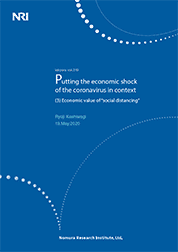Capital Markets & IT - lakyara May 2020

Financial institutions are under constant pressure to reduce costs, improve operational efficiency, adapt to regulatory changes and grow their business. NRI believes that a combination financial knowledge and information technology are crucial to the industry’s growth and development.
Through our lakyara reports, NRI identifies the various capital markets and IT issues impacting our clients and the future of their business.
Contents List
-
Capital Markets
Putting the economic shock of the coronavirus in context (3)
Economic value of “social distancing”
- 執筆者
- Ryoji Kashiwagi
- 所属・職名
- Senior Researcher Financial Market & Innovation Research Department
-
Capital Markets
Putting the economic shock of the coronavirus in context (2)
Why cash compensation for income and business losses is needed
- 執筆者
- Ryoji Kashiwagi
- 所属・職名
- Senior Researcher Financial Market & Innovation Research Department
-
Capital Markets
Putting the economic shock of the coronavirus in context (1)
Overview using a macroeconomic model
- 執筆者
- Ryoji Kashiwagi
- 所属・職名
- Senior Researcher Financial Market & Innovation Research Department
* Organizations/Titles reflected are current as of publishing date.
